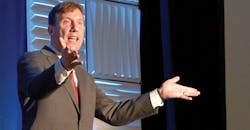Managing Millennials - Author, speaker Tulgan outlines strategies for motivating, retaining younger generation in today’s changing workplace
Millennials aren’t lazy, entitled idiots.
In fact, they’re capable of becoming the highest-performing generation in history – with the right high-maintenance management strategy.
That was author and motivational speaker Bruce Tulgan’s message to Truck Trailer Manufacturers Association members in his talk, called “The RainMaker Thinking: Hiring and Keeping the Millennial Generation,” during the 76th annual convention in Santa Ana Pueblo NM.
Tulgan’s company, RainmakerThinking, has tracked demographic patterns for 25 years, paying close attention to the generational shift in the workforce in an effort to help leaders alter their views on how to manage young people and develop concrete strategies to use in their organizations.
The goal is to attract and retain the best young talent, then drive their performance, but for many companies, that’s easier said than done.
“What most leaders tell us is, it’s not just my boss squeezing me, it’s everyone, including the people I’m trying to manage, and I’m stuck in the middle,” Tulgan said.
“I’ve got too many people to manage, some of the people I manage work in remote locations, some of the people I manage work a different schedule than I work … and then meanwhile, I’m busy.
“I don’t have time to hold everybody’s hand!”
As many as six generations work side-by-side in today’s workplace, depending on who’s consulted, but the largest groups are the Baby Boomers, who were born from 1946 to 1964 – and are hitting retirement age (65) at a rate of 10,000 per day – and Millennials, born between 1978 and 2000.
Tulgan divided them into two waves, with the first (1978-89) comprising 27 percent of the workforce and the second (1990-2000) nearly 21 percent.
That’s a lot of me-me-mes to manage.
“The grownups are leaving,” Tulgan said.
But that’s always been the case, right? People grow old and retire and younger people take their place. Why’s it a problem now?
Tulgan points out three differences in the generational change in today’s workforce – the growing gap between the youngest and oldest workers, a lack of leadership for a generation that was micro-managed from crib to college, and the rapid pace of change reversing the familiar generational order.
First, as workers retire, they take their skills, knowledge, wisdom, institutional memory, relationships and old-fashioned work ethic with them, leaving companies reeling and younger workers directionless.
So, leaders must do more than plan a line of succession. They need to think about transferring knowledge, wisdom and relationships.
Second, manage, manage, mange those Millennials.
They were guided every step along the way, then they show up for their first day of work and they’re told to “sink or swim.” Tulgan said the No. 1 cause for early voluntary departure among new young talent is a lack of structured on-boarding, including guidance, direction, support and coaching.
“If you want high performance out of the new emerging workforce, you better commit to high-maintenance management, and you will drive performance through the roof,” Tulgan said.
Third, the rapidly increasing pace of change, spurred by social media and life-changing advancements in technology, among other factors, is reversing the traditional generational hierarchy, where younger people eventually “settle down” and become more like their “mature” elders.
“The second-wave millennials are like canaries in a coal mine – where they are, is where we’re all going,” Tulgan said.
Tulgan’s advice: Don’t shy away from that enthusiastic but high-maintenance Millennial.
Hire him or her first.
Then make sure the company’s structured with supportive, coaching-style leadership to show them the way.
“When young people show up on Day 1, saying ‘I’m here!’ you have to ask yourself, is your organization set up to pour gasoline on that spark or is your organization set up to pour water on that spark,” Tulgan said.
But what about resource-restrained companies who can’t cater to everyone like Google or Facebook, with flexible schedules and nap time?
No problem.
Work’s still a transactional relationship, and there are plenty of ways to add value, like establishing expectations and creating accountability – because Millennials are not afraid of keeping scoring.
“You can do more for everyone, you can do less for everyone, (and) there’s only one other logical possibility – do more for some people and less for others,” Tulgan said. “The only fair way to do that is based on what they deserve, and the only way to make that happen is if you’re setting up everyone for success.”
About the Author
Jason McDaniel
Jason McDaniel, based in the Houston TX area, has nearly 20 years of experience as a journalist. He spent 15 writing and editing for daily newspapers, including the Houston Chronicle, and began covering the commercial vehicle industry in 2018. He was named editor of Bulk Transporter and Refrigerated Transporter magazines in July 2020.

